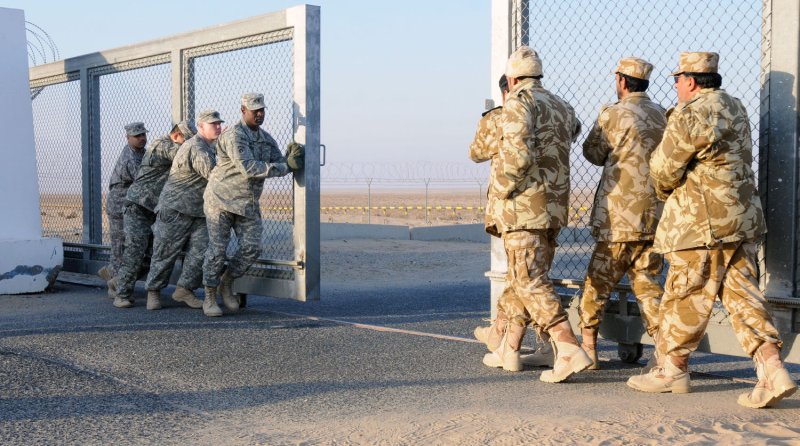This December 18, 2011 DOD image shows U.S. and Kuwaiti service members closing a gate between Kuwait and Iraq following the final convoy of Operation New Dawn passing through. The last convoy that crossed the border signaled the end of the transition of troops and equipment from Iraq as Operation New Dawn came to a close. UPI/Jordan Johnson/DOD |
License Photo
WASHINGTON, Dec. 29 (UPI) -- The United States plans to go ahead with a nearly $11 billion sale of arms and training to Iraq despite concerns about the country's future, officials said.
The sale of the weapons -- some of which have been delivered -- is proceeding even though Iraqi Prime Minister Nouri al-Maliki, a Shiite, hasn't fulfilled an agreement that would have limited his ability to de-emphasize the Sunnis and turn the military into a sectarian force, The New York Times reported Wednesday.
U.S. diplomats, including Ambassador to Iraq James F. Jeffrey, have said they're concerned about the military relationship with Iraq, with some saying there could be political fallout if not managed properly by President Obama's administration.
"It is very risky to arm a sectarian army," Rafe al-Essawi, Iraq's finance minister and a Sunni politician, told the Times. "It is very risky with all the sacrifices we've made, with all the budget to be spent, with all the support of America -- at the end of the day, the result will be a formal militia army."
Officials in the Defense and State departments said the sales agreements come with conditions that allow inspectors to monitor how the arms are used to ensure the terms of the sale aren't violated.
"Washington still has considerable leverage in Iraq by freezing or withdrawing its security assistance packages, issuing travel advisories in more stark terms that will have a direct impact on direct foreign investment, and reassessing diplomatic relations and trade agreements," said Matthew Sherman, a former State Department official. "Now is the time to exercise some of that leverage by publicly putting Maliki on notice."
However, some analysts told the Times they think the U.S. economic situation gives Maliki leverage.
"I think he would like to get the weapons from the U.S.," said Kenneth Pollack, a national security expert at the Brookings Institution and a critic of the administration's Iraq policy. "But he believes that an economically challenged American administration cannot afford to jeopardize $10 billion worth of jobs."















